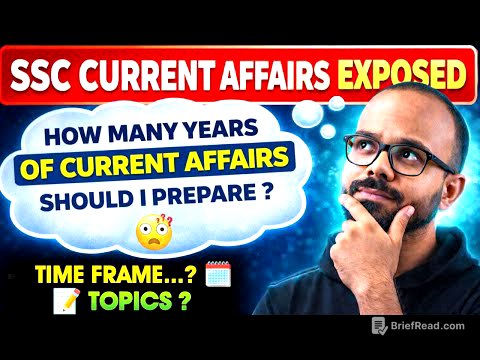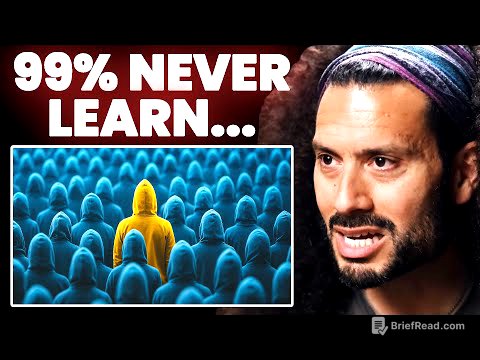TLDR;
This video reviews Series 12 of Doctor Who, discussing each episode in detail, including "Spyfall," "Orphan 55," "Nikola Tesla's Night of Terror," "Fugitive of the Judoon," "Praxeus," "Can You Hear Me?," "The Haunting of Villa Diodati," "Ascension of the Cybermen," and "The Timeless Children." It also explores the historical context, character analysis, and plot criticisms, and provides insights into the series' themes and connections to classic Doctor Who.
- Spyfall has cool casting but Lenny Henry is miscast.
- Orphan 55 is a love letter to early 80s Who but it's not good.
- Fugitive of the Judoon has a lot of possibilities but it's fairly meh.
- The Timeless Children has some major roots in Doctor Who.
Intro [0:00]
The author introduces the concept of showrunners in Doctor Who, highlighting the importance of a strong relationship between the head writer and producer. They suggest that previous showrunners like Russell T. Davies and Steven Moffat could have benefited from such a dynamic. The author then transitions to discussing Series 12, drawing a parallel to the successful partnership of Philip Hinchcliffe and Robert Holmes during Tom Baker's era.
Spyfall [1:51]
The review of "Spyfall" begins with a critique of its style, describing it as overly referential and self-aware. Despite this, the author admits it's better than expected. Stephen Fry's casting as the head of MI6 is appreciated, and the use of the code name "C" is noted. However, Lenny Henry's portrayal of the main villain is criticized as miscast. The Master's return is praised, particularly the use of a tissue compression eliminator. The author points out a timing issue in part one, questioning how the Australian secret service arrived so quickly to protect the Master in the outback. Additionally, they criticize MI6's disbelief in extraterrestrial life, given the frequent alien attacks in the UK. The monsters in "Spyfall" are commended for their design, resembling a more realized version of the 3D boneless from "Flatline." Part two is compared to a Moffat-era two-parter, appreciating the historical figures and settings. The depiction of Ada Lovelace is praised for its accuracy, though the episode incorrectly refers to her as "Miss Gordon." The inclusion of Noor Inayat Khan is appreciated, but her character feels short-changed. A complaint is raised about Graham's reaction to the Master's comment about the Doctor being a man, finding it illogical that he wouldn't consider the possibility of the Doctor being trans. The Master's perception filter is deemed unnecessary. Overall, the author enjoyed "Spyfall," viewing it as a cover version of previous showrunners' styles.
Orphan 55 [15:06]
"Orphan 55" is described as a love letter to early 80s Doctor Who, with a cheap aesthetic reminiscent of "Leisure Hive" and "Warriors' Gate." The monsters are criticized for being poorly designed and executed. The plot is questioned, particularly Kane's decision to build a resort on a planet with dangerous native life. The author finds the attempt to rescue the old men illogical and compares it unfavorably to "Aliens." The episode's environmental message is seen as unsubtle. Despite these criticisms, the author acknowledges the episode's political message and the performances of the actors.
Nikola Tesla's Night of Terror [20:41]
"Nikola Tesla's Night of Terror" is praised for its use of semi-obscure historical details and the portrayal of Nikola Tesla. Robert Glenister's performance as Thomas Edison is noted, though his line about the UK not understanding business is criticized as historically inaccurate. The episode accurately depicts the Edison-Tesla relationship. However, the Skithra are criticized as poorly designed and derivative of other sci-fi villains. The episode's educational aspect is highlighted, with its inclusion of details about Tesla and Edison. The author appreciates Tesla's desire to study the TARDIS. Despite the negative aspects, the author considers this a solid episode.
Fugitive of the Judoon [25:41]
The author expresses strong admiration for Jo Martin's new Doctor, praising her performance, costume, and the character's haughty demeanor. The return of Captain Jack Harkness is also celebrated. The author discusses various possibilities for where this new Doctor fits into the established timeline, including pre-Hartnell, between Two and Three, or a future Doctor. The episode is described as a must-watch due to the excitement it generates, despite being "fairly meh" overall.
Praxeus [30:02]
"Praxeus" is considered a competent but unremarkable episode, repeating the themes of "Orphan 55" less bluntly. The international locations are praised, and the deaths caused by the space virus have great effects. The villain's motivations are seen as unique and sympathetic. The author notes the irony of the episode airing just as the COVID-19 pandemic was beginning. The alien scientist's failure to understand the biological differences between humans and her species is criticized. The author enjoyed seeing Yaz as the Doctor's companion for a while.
Can You Hear Me? [33:01]
This episode features Ian Gelder as Zelan, a godlike being causing trouble through nightmares. The author criticizes the CGI as awful. The companions are given a break, allowing them to ruminate on their experiences. Ryan's storyline is criticized for not being more personal and for using nightmares to address serious issues like social anxiety and depression. The author questions why Ryan's friend is experiencing the nightmares at all. Despite these criticisms, the author generally likes the episode, particularly the Doctor's confrontation with Zelan and the references to other powerful beings in Doctor Who lore. The animation showing Zelan's origin is praised, as is the alien computer controlled by a laser harp. The author expresses a desire for a historical companion. The episode's inclusion of extra information, such as the medical advancements in the medieval Islamic world, is appreciated.
The Haunting of Villa Diodati [39:23]
The setting of Villa Diodati is praised as wonderful for a historical episode. The author notes the presence of Lord Byron, Percy and Mary Shelley, and Claire Claremont, and discusses the events that led to the creation of modern vampire fiction and Frankenstein. The author is shocked it took so long for this story to happen in the TV show. The guest actors are considered good matches for the actual poets, though Byron's character is toned down. The story seems to feature actual ghosts, and the villain, Ashad, is seen as overly evil. The author suggests Ashad would have worked better as an innocent being driven by programming. The author likes the Doctor's rant about saving Shelley.
Ascension of the Cybermen [44:24]
This episode has two main stories: the Doctor and crew helping human refugees survive against the Cybermen, and the story of Brendan, an Irish policeman who discovers he is invincible and has his mind wiped. The author notes the obscure in-joke of Ireland being a reimagined version of Gallifrey. The Cyber War is criticized for involving too few people. A new Cyberman design is introduced. The author praises Patrick O'Kane's performance as Ashad. The episode ends with the TARDIS separated by light years, the Cybermen ascending, and the Master stepping through a portal.
The Timeless Children [48:39]
This episode has two main sections: more Cyber nonsense and the Master giving a detailed explanation of the Morbius Doctors. The author hates the Master destroying Gallifrey. The author discusses the timeless child and its roots in Doctor Who lore, including the Morbius Doctors and the Other. The author is undecided about the Master using the Matrix to show the Doctor's backstory. The author criticizes the Cybermen's assimilation of the dead to create Cyberlords. The author does not like the idea that the Time Lords stole regeneration from elsewhere. The author presents alternate versions of the timeless child story. The author notes that Series 12 is very different from Series 11, with Chibnall diving right into a dramatic arc. The author wonders if this was always planned or if the BBC asked him to go back to the Davies and Moffat structure. The author admires the show for keeping secrets. Overall, the author didn't like Series 12 as much as Series 11 but would still put it in the upper handful of new Who series.









